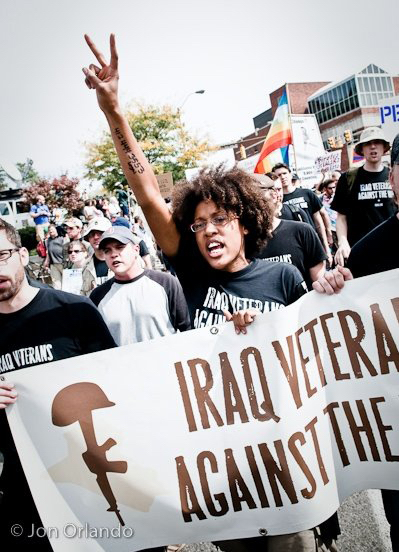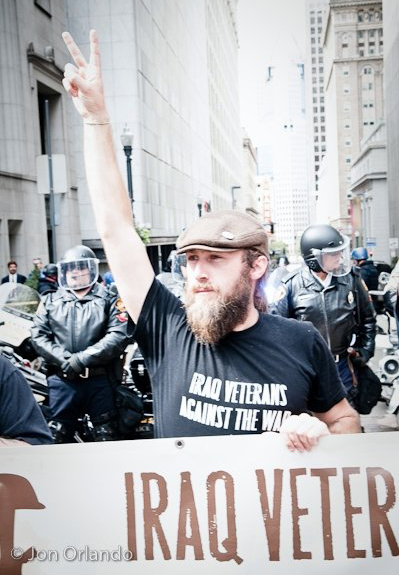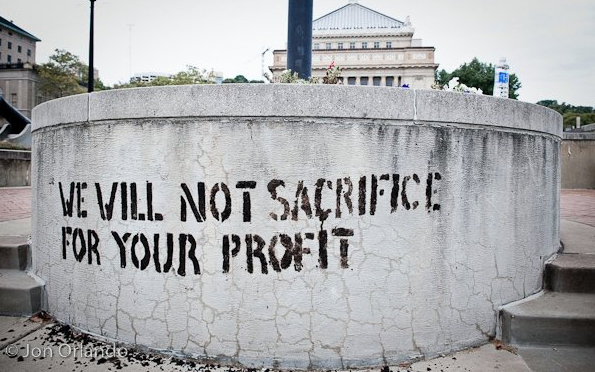 Download PDF of this full issue: v39n2.pdf (11.6 MB) Download PDF of this full issue: v39n2.pdf (11.6 MB) |
The Decision to Hold the G20 Summit in My Home Town
By Joyce Wagner
[Printer-Friendly Version] The decision to hold the G20 summit in my hometown of Pittsburgh, Pennsylvania was announced in late May and came as a huge surprise to everyone here. To me, taking action seemed obvious, but how? Our chapter was brand new and had only 3 members. We spent many hours from late May until the summit and beyond working closely with Veterans for Peace, Codepink and the Women's International League for Peace and Freedom. We engaged in battles for permits and wondered what would happen if, for any number of reasons, our efforts in organizing around the G20 failed.

|
|
Chantelle Bateman
|
Although we collaborated with other local groups on marches and tent cities, we decided it would be best to do a creative, direct action with members of IVAW, VVAW and VFP. Throughout the planning process, we made it a priority to constantly consider the relationship between our cause (ending the war) and the G20. We ultimately determined that our message would best be served through a creative and interactive living memorial at the Soldier's and Sailor's Memorial Hall. We made large stencils stating, "We will not kill for your profit," and "We will not sacrifice for your profit," that made our message simple and clear. Early morning, Friday, September 25, we transferred these messages to the sidewalk in front of the hall, mud instead of paint symbolizing the dirty treatment of veterans both in the war and upon their return.
During the following speak-out, veterans from various wars told stories about what they had sacrificed in the name of profit, followed by an affirmation that they would not be sacrificing for profit anymore. This was followed by a moment of silence to allow people to reflect upon what had been sacrificed. When the moment of silence ended, we asked that participants write their thoughts about these sacrifices on the sidewalk using chalk.
Leading up to the G20, I engaged in a number of discussions with other organizers in the city concerning the role of the police, National Guard (who deployed to Pittsburgh in order to help with security) and demonstrators. I believed then and still believe now that humanizing and individualizing members of the police force and National Guard is significantly more effective than engaging them combatively. It creates a greater likelihood of gaining allies and expanding membership, which in turn creates a larger movement. As veterans, this is a concept that should be familiar to us. On September 24, the first day of the summit, I joined 4 other members of IVAW in a walk around the city to engage in discussion with members of the National Guard on duty that morning. An action important not only because of the outreach to the soldiers on duty, but because it served as a reminder that we are not so different from them, even now.

|
|
Jason Hurd at G20 protest
|
The action itself, as well as the process of organizing, was successful for several reasons. Our chapter's membership has more than doubled. Planning the action and successfully following through significantly built the confidence of our membership. We were able to develop new local allies and strengthen those that we already had made. Bringing members to Pittsburgh and being able to engage creatively with one another was a very positive experience as well.
I believe that the memorial that we held successfully conveyed our message to those who were present. In extremely close proximity to the University of Pittsburgh's student union, dormitories and the Cathedral of Learning, we were able to reach a large number of students who we may not have reached if we had planned an action on another day or in a different location. We worked within the framework of the memorial rather than confronting it. This was very important. The memorial states that it is there to "honor all those who have served." We weren't attempting to dishonor anyone; we were just adding another layer to the memorial by pointing out that their loss was for the profit of the few. This, along with our own identity as veterans seemed to make our message more legitimate to our audience.
One very obvious drawback that is becoming ever more apparent is the distraction caused by the summit. People became so engrossed in organizing around the summit, obtaining permits, fighting for free speech and other problems, that focus was shifted away from the larger issue at hand, namely working to end the war. Large numbers of demonstrators, students, media and medics (including IVAW member Jeff Bartos from Connecticut) were wrongly arrested. Rubber bullets, tear gas and sound cannons were among weapons used by the police for crowd control. Although this is a serious issue, local peace and social justice groups and activists have become so embroiled in a quest for justice against the police that the anniversary of the war in Afghanistan went by more or less unnoticed. Groups plan to hold a generic protest on October 17, but continue to relate it to the G20, stating, "G20 riot cops will not keep us silent." For our chapter, I would like to think that the G20 event has come and gone, preparing us for bigger and better things - things that are aimed at ending the war.
Joyce Wagner served in Iraq as a marine and is currently the Chapter President of IVAW's newest chapter, Chapter 63 in Pittsburgh.
|





